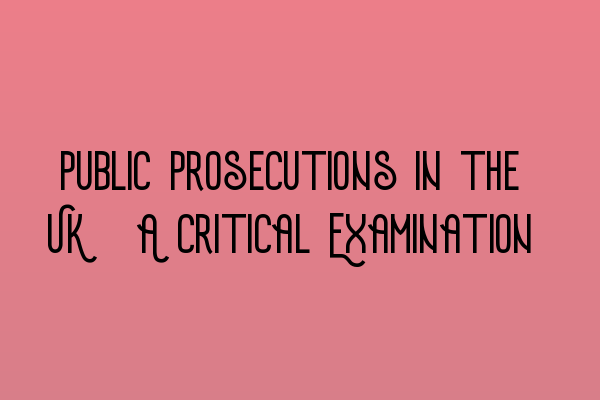Public Prosecutions in the UK: A Critical Examination
Welcome to the blog of SQE Criminal Law & Practice Law UK, where we provide expert insights into various legal topics.
In this post, we will critically examine the public prosecutions system in the United Kingdom and highlight
some key aspects that deserve closer attention.
Overview of Public Prosecutions
Public prosecutions, undertaken by the Crown Prosecution Service (CPS), play a crucial role in the UK legal system.
The CPS is responsible for prosecuting criminal cases on behalf of the state. From minor offenses to serious crimes,
the CPS ensures that justice is served and that the rights of both the accused and the victims are protected.
However, despite the importance of this system, there are certain areas that need to be critically examined to ensure
a fair and efficient legal process. Let’s delve into some of these areas.
Transparency and Accountability
One of the key concerns surrounding public prosecutions is the issue of transparency and accountability. It is essential
for the public to have confidence in the criminal justice system and believe that decisions are made objectively and
without bias. This necessitates increased transparency in the decision-making process of the CPS, as well as mechanisms
for holding prosecutors accountable for their actions.
To address this concern, it is crucial for the CPS to provide clear guidelines and explanations for their decisions.
Additionally, there should be a system in place for reviewing and challenging these decisions, ensuring that any
potential errors or biases are rectified.
Prosecutorial Discretion
Another area that warrants examination is prosecutorial discretion. While it is essential for prosecutors to have
some leeway in determining which cases to pursue and how to handle them, there is a need for checks and balances
to prevent misuse of this discretion.
Ensuring consistent and fair application of the law is crucial. Prosecutors should be guided by clear principles
and guidelines to minimize the risk of any biases or inconsistencies that may arise. Regular training and evaluation
of prosecutors’ performance can help maintain professionalism and adherence to a standardized approach.
The Role of Technology
In today’s digital age, the use of technology has become increasingly relevant in the legal field. Embracing
technological advancements can enhance the fairness and efficiency of public prosecutions in the UK.
Technological tools such as case management systems, data analytics, and evidentiary software can streamline
processes, improve data analysis, and facilitate effective collaboration between prosecutors and other stakeholders
in the criminal justice system. Investing in these technologies can lead to better outcomes and more transparent
prosecutions.
Conclusion
In conclusion, public prosecutions in the UK are a vital part of the criminal justice system. However, it is essential
to critically examine various aspects of this system to ensure fairness, transparency, and accountability.
At SQE Criminal Law & Practice Law UK, we are committed to promoting a robust legal framework and providing expert
advice to legal professionals. If you’re interested in related topics, you may find the following articles helpful:
Legal Representation for Delaware LLCs in the UK: Expert Advice,
Ensuring Ethical Business Practices: Delaware’s Code of Conduct,
Legal Challenges for UK Businesses in the U.S.: Strategies for Overcoming Hurdles,
UK Criminal Law: An In-Depth Analysis of the British Legal System, and
Legal Challenges for UK Businesses in the U.S.: Strategies for Overcoming Hurdles.
Stay tuned to our blog for more insightful articles on various legal topics. If you have any questions, feel free
to reach out to us.
